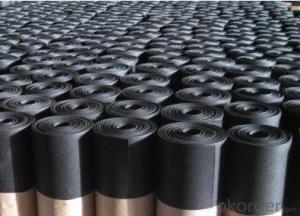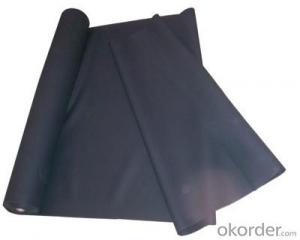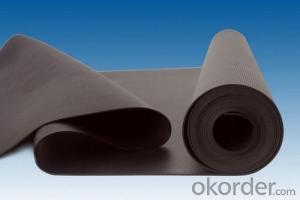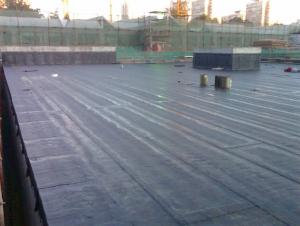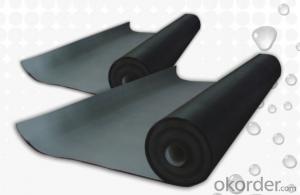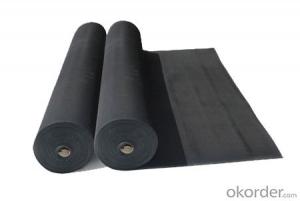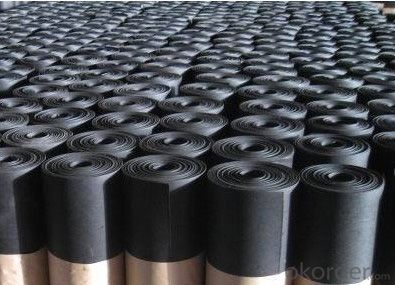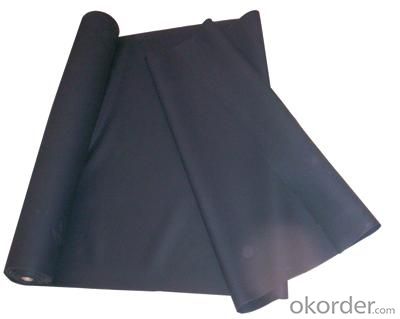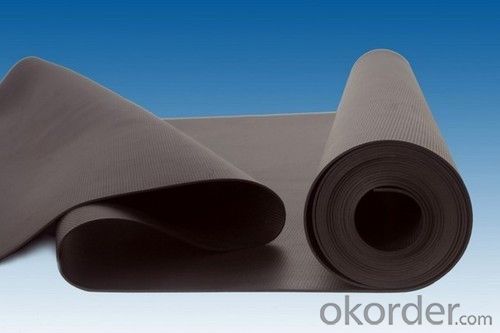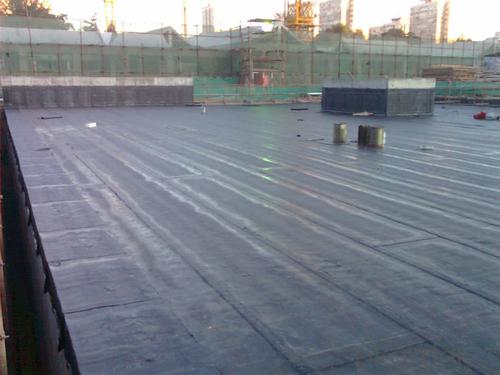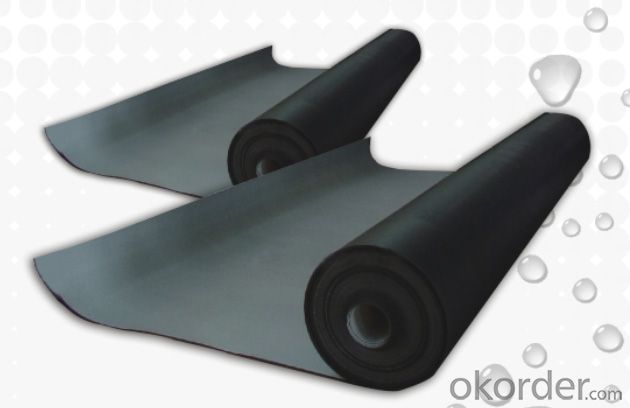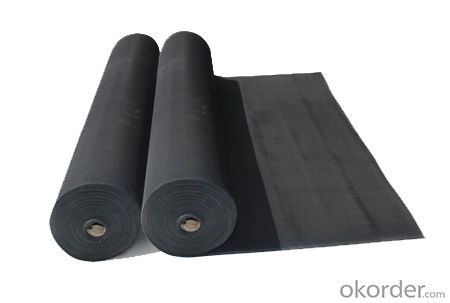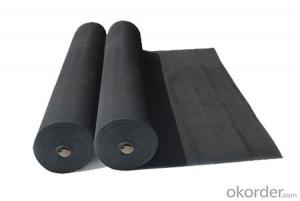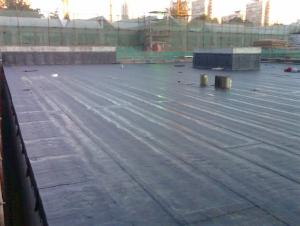EPDM Coiled Rubber Waterproof Membrane with 1.1mm Thickness
- Loading Port:
- Shanghai
- Payment Terms:
- TT OR LC
- Min Order Qty:
- 20000 m²
- Supply Capability:
- 5000000 m²/month
OKorder Service Pledge
OKorder Financial Service
You Might Also Like
EPDM Coiled Rubber Waterproof Membrane with 1.1mm Thickness
Description Of EPDM Coiled Rubber Waterproof Membrane with 1.1mm Thickness:
This waterproof coiled material is of high elasticity with best performance among high polumer
waterproof coiled material in the world.It is also the most typical one in the world.Waterproof coiled material made of ternary ethylene-propylene rubber is produced withthe use of the most advanced contiuous extrusion and vulcanization technology and related equipments which are specially designed for production of such product.It is good in compactness,without bubble and performance difference in length and breadth,perfomances reach or exceedthe demands of GB18173.1-2000 standard.
Main Features of EPDM Coiled Rubber Waterproof Membrane with 1.1mm Thickness:
A.Polyester based SBS Modified Bitumen Waterproofing Membrane
a. Strong impermeability
b. High tensile strength, elongation, ability to adapt the grassroots shrinkage deformation and cracking
c. Puncture-resistant, broken resistant, tear-resistant
d. The corrosion resistance, resistance to mildew, weathering good
e. Construction convenient, hot-melt can be operated Four Seasons Construction, reliable joints
B. Fiberglass based SBS Modified Bitumen Waterproofing Membrane
a. High tensile strength, stability of a good size
b. High Temperature good performance
c. Damage resistance, corrosion resistance, resistance to mildew, weathering good performance
d. Good construction performance, reliable joints.
Specifications of EPDM Coiled Rubber Waterproof Membrane with 1.1mm Thickness:
| Material | EPDM Rubber |
| Size | 1.2m (width)*20m (length) or customized, weldable type 2.05m or 4m width |
| Thick | 1.2mm, 1.5mm, 2.0mm |
| Type | Vulcanized & Weldable |
| Pattern | Non-reinforced (homogeneous) |
| Certificate | ISO9001/14001 |
Applications of EPDM Coiled Rubber Waterproof Membrane with 1.1mm Thickness:
1. Roofs, Basement, Toilet
2. Industrial and civil building waterproofing
3. Geo-synthetic liner for swimming pool, channels, irrigation system
4. Especially suit for projects with high requirements in durability, anti-corrosion and deformation
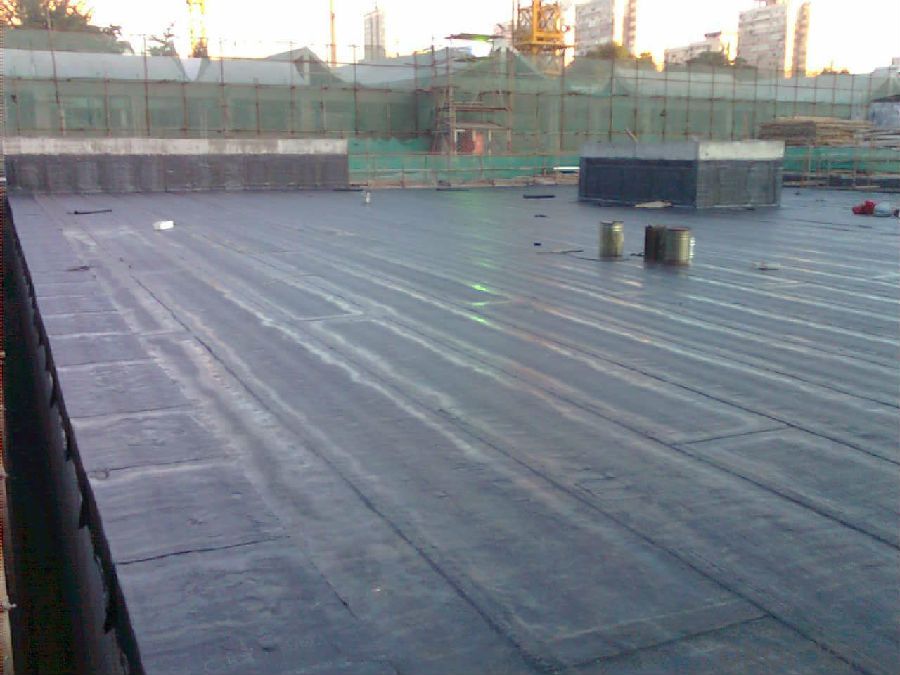
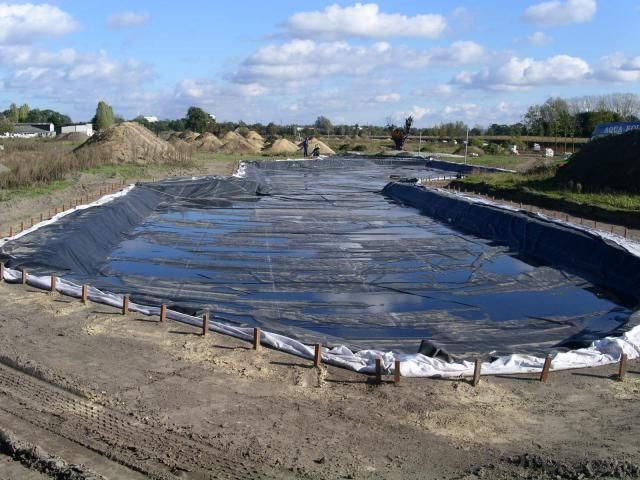
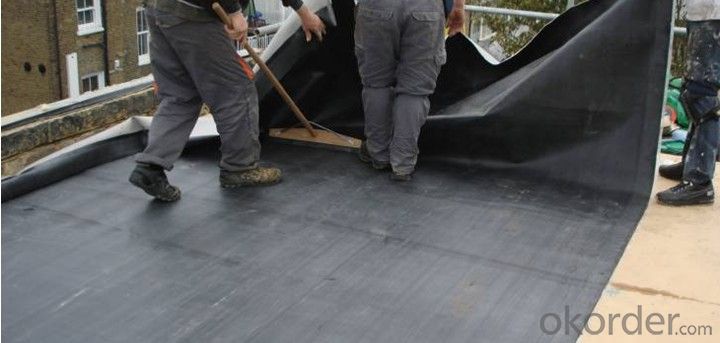
IMages of EPDM Coiled Rubber Waterproof Membrane with 1.1mm Thickness:
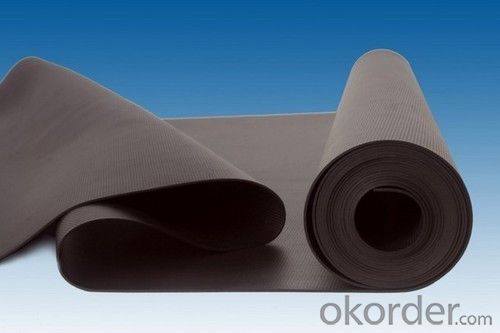
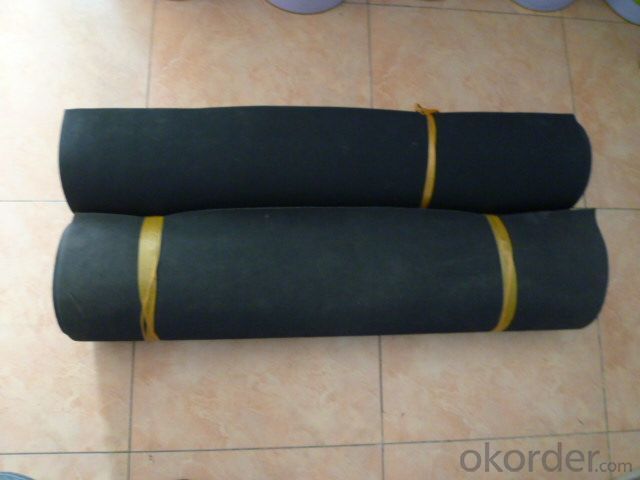
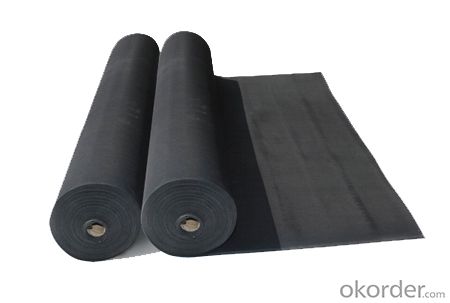
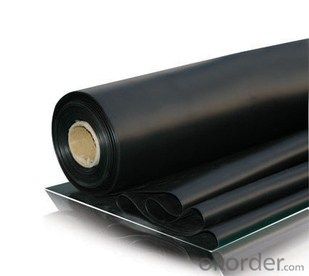
FAQ of EPDM Coiled Rubber Waterproof Membrane with 1.1mm Thickness:
1. What are we supplying?
We are specialized in producing Colorful Asphalt Roof Shingle, SBS/APP modified bitumen waterproof membrane, Self adhesive bitumen waterproof membrane, PVC waterproofing membrane, EPDM rubber roofing membrane, Single Component Polyurethane Waterproof Coating, and Spray Polyurea Waterproof Coating
.
2. How Many years experience do we have?
We have been exported to more than 20 countries in the past 15 years.
3. How long do we usually reply your request?
We always reply our customer within 24 hours.
- Q: Can a waterproofing membrane be used on precast chrome surfaces?
- Yes, a waterproofing membrane can be used on precast chrome surfaces. Waterproofing membranes are often used to protect surfaces from water damage and prevent moisture from seeping into the structure. Precast chrome surfaces can also benefit from the application of a waterproofing membrane to ensure their longevity and durability. The membrane will create a barrier between the surface and any potential water intrusion, thereby protecting the precast chrome and maintaining its appearance and functionality. It is important to choose a waterproofing membrane that is compatible with chrome surfaces and follow the manufacturer's instructions for proper application.
- Q: Can waterproofing membranes be used on mechanical equipment rooms?
- Yes, waterproofing membranes can be used on mechanical equipment rooms. These membranes are designed to provide a protective barrier against water intrusion and prevent moisture damage to the underlying structures. Mechanical equipment rooms, which often house sensitive and expensive equipment, can benefit from the installation of waterproofing membranes to ensure the longevity and functionality of the machinery. By applying waterproofing membranes to the walls, floors, and ceilings of these rooms, it helps prevent water leaks, moisture buildup, and potential damage caused by water infiltration. This can be particularly important in areas prone to heavy rainfall, high humidity, or where the water table is high. Waterproofing membranes can also help in controlling condensation and preventing mold growth, which can be detrimental to the performance of mechanical equipment. Overall, the use of waterproofing membranes in mechanical equipment rooms is a practical and effective solution to protect the equipment and maintain their optimal performance.
- Q: Can waterproofing membranes be used on bridge decks?
- Bridge decks can benefit greatly from the application of waterproofing membranes. Due to the constant exposure to harsh weather conditions like rain, snow, and freeze-thaw cycles, the concrete and steel reinforcement of bridge decks can deteriorate. Waterproofing membranes are specifically designed to counter water infiltration and safeguard the bridge deck against damage caused by moisture. Typically composed of flexible materials like bitumen, PVC, or EPDM rubber, these membranes are directly applied to the surface of the bridge deck. Acting as a barrier, they prevent water from seeping into the concrete and causing corrosion of the reinforcement. They also help minimize crack formation and extend the lifespan of the bridge deck. Furthermore, the effectiveness and durability of waterproofing membranes can be enhanced by combining them with other protective coatings or systems. All in all, the utilization of waterproofing membranes on bridge decks is a widely employed and successful approach to ensure the long-term integrity and functionality of the structure.
- Q: Can a waterproofing membrane be used on both interior and exterior surfaces?
- Both interior and exterior surfaces can benefit from the use of a waterproofing membrane. These membranes are created with the purpose of safeguarding surfaces against water infiltration and harm. Rubber, asphalt, or thermoplastic materials are commonly utilized to construct these membranes, which form a barrier to prevent moisture from penetrating. Whether applied to interior walls, floors, or exterior foundations, roofs, or balconies, a waterproofing membrane is highly effective in averting issues such as leaks, mold, or structural damage caused by water seepage. It is crucial to carefully consider the unique requirements of each surface and select an appropriate waterproofing membrane for the intended use.
- Q: Are waterproofing membranes resistant to chemical solvents?
- Waterproofing membranes are generally capable of withstanding chemical solvents. They are designed to endure exposure to different chemicals, including solvents. These membranes are formulated to create a barrier against moisture and safeguard against damage caused by chemical contact. The ability to resist chemical solvents is a crucial characteristic of waterproofing membranes, as it guarantees their durability and effectiveness in various applications like construction, roofing, and below-grade waterproofing. However, it is important to mention that the specific resistance of a waterproofing membrane to chemical solvents may differ based on the type and brand of membrane used. Therefore, it is always advisable to refer to the manufacturer's guidelines for detailed information on chemical resistance.
- Q: Are waterproofing membranes resistant to acid rain?
- Yes, waterproofing membranes are generally resistant to acid rain due to their ability to protect against water penetration and chemical exposure.
- Q: Can a waterproofing membrane be used for pond or pool applications?
- Yes, a waterproofing membrane can be used for pond or pool applications. These membranes are specifically designed to create a water-tight barrier, making them suitable for preventing leaks and ensuring the structural integrity of ponds and pools.
- Q: Are waterproofing membranes resistant to hail damage?
- Waterproof membranes serve the purpose of safeguarding against water infiltration, but they do not typically possess resistance against hail damage. Hail has the capacity to inflict substantial harm upon roofing materials, including waterproof membranes, by puncturing or ripping them. This can jeopardize the integrity of the membrane, thereby leading to leaks and water penetration. Although certain membranes may possess a degree of resilience against hail damage, it is important to acknowledge that no waterproof membrane can offer complete protection against all forms of hailstones. Hence, it is prudent to adopt appropriate preventive measures, such as incorporating additional safeguards like hail guards or considering the usage of impact-resistant membranes, in order to minimize the potential damage that may be incurred due to hail.
- Q: How does a waterproofing membrane handle exposure to UV rays?
- A waterproofing membrane is designed to have excellent resistance to UV rays. It typically contains additives or stabilizers that protect it from the damaging effects of sunlight. This helps to prevent degradation, discoloration, and potential weakening of the membrane due to prolonged exposure to UV rays.
- Q: Can a waterproofing membrane be used for a stadium?
- Yes, a waterproofing membrane can be used for a stadium. A waterproofing membrane is designed to provide a barrier against water infiltration, making it an ideal solution for protecting the structure of a stadium from water damage. It can be used on various parts of the stadium, including the roof, walls, and foundation, to prevent leaks and moisture seepage. Additionally, a waterproofing membrane can help to extend the lifespan of the stadium by protecting it from the harmful effects of water, such as corrosion and mold growth. Overall, using a waterproofing membrane for a stadium is a practical and effective way to ensure its durability and longevity.
Send your message to us
EPDM Coiled Rubber Waterproof Membrane with 1.1mm Thickness
- Loading Port:
- Shanghai
- Payment Terms:
- TT OR LC
- Min Order Qty:
- 20000 m²
- Supply Capability:
- 5000000 m²/month
OKorder Service Pledge
OKorder Financial Service
Similar products
Hot products
Hot Searches
Related keywords
